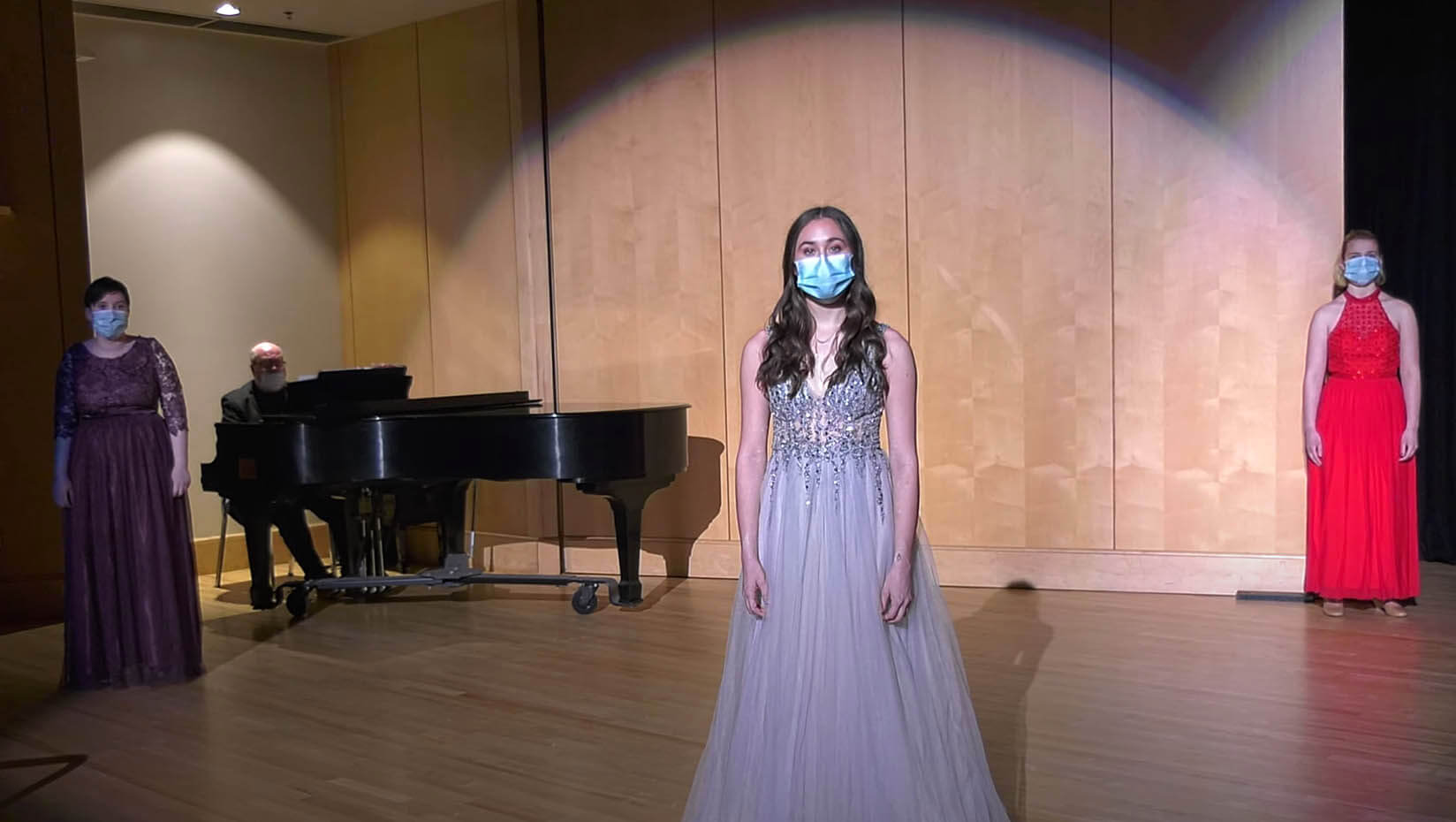
For UMaine Opera Workshop, the show goes on
Opera as an art form has been around for more than 400 years, and students and faculty in the UMaine School of Performing Arts were not going to let a pandemic stop their performance from going ahead. That’s why, for the first time ever, the University of Maine Opera Workshop has chosen to present its fall 2020 scene performance in video format.
The video, available on YouTube and via the UMaine Opera Workshop Facebook page, collects student performances of a variety of opera scenes across the form’s history, the sum of a semester of hard work by students enrolled in voice instructor and Opera Workshop director Isaac Bray’s MUE 132 ensemble.
“In those 400 years, the world has seen countless wars, plagues and other hardships,” Bray says. “Nevertheless, opera has endured.” For Bray and the students, the decision was not whether the performance would go on, but how. Given restrictions on audience sizes and potential challenges with livestream video and audio quality, the workshop decided to assemble a video performance of a semester’s highlights.
Students in the UMaine Opera Workshop learn the nuts and bolts of operatic music, a genre that differs from the kind of performances that many students and contemporary audiences are used to. There are no microphones in opera, and the music is often in a different language. Students are tasked not only with projecting their voices and pronouncing in unfamiliar languages, but with communicating the text and story of the piece to an audience: challenges magnified by masking and social distancing.
The University of Maine’s comprehensive COVID-19 health and safety protocols made it possible for the workshop to meet in person as they rehearsed and fine-tuned. Nevertheless, public health guidance presented challenges for Bray, accompanist Clayton W. Smith and the student performers.
Selecting scenes required Bray to choose only from those featuring three or few performers on stage at a time; rehearsals were limited to 30 minutes per CDC guidelines, and students also remained masked and distanced on-stage. To maximize aerosol dispersal, workshop members even alternated classrooms.
“We actually walked back and forth between room 100 and Minsky Recital Hall in Class of 1944 Hall. With rehearsals limited to 30-minute segments, we did a lot of walking during our 2.5 hour classes each Monday and Wednesday,” Bray says.
Still, says workshop member Sabrina Sudol, a junior from Ramsey, New Jersey who is double majoring in studio art and music, it all came to seem fairly natural. “I feel so lucky that with a few adjustments we were able to have opera this semester and stay safe while creating something so unique,” Sudol says.
Erin Farrell, a music education major from Saco, Maine, agreed that the precautions came to feel like second-nature: “Everyone was dedicated to following the rules.”
For Sudol, Farrell and Juno Buendia, a senior music education major from Waldoboro, the workshop being able to proceed meant an enriching experience. “It’s an opportunity to explore a different type of music I didn’t have much experience in and that our generation should acknowledge more,” says Buendia.
For Sudol, the opera workshop was important for expanding her knowledge and repertoire as a classical musician. And for Farrell, Bray’s opera instruction was a chance to leave her comfort zone, noting that “it’s given me a great community of friends and teachers.”
The video is not only a document of student performances, it’s a glimpse as well of a moment in time that Bray thinks is worth documenting and remembering.
“Regardless of where all of these students end up and where their musical careers take them,” he says. “I wanted them to have a memento of this very challenging and unique time that we are living through. I hope that this music provides entertainment and comfort for everyone stuck at home right now.”
Contact: Brian Jansen, brian.jansen@maine.edu
